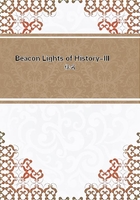
第95章
Hitherto Wyclif had simply protested against the external evils of the Church without much effect, although protected by powerful laymen and encouraged by popular favor. The time had not come for a real and permanent reformation; but he prepared the way for it, and in no slight degree, by his translation of the Scriptures into the vernacular tongue,--the greatest service he rendered to the English people and the cause of civilization. All the great reformers, successful and unsuccessful, appealed to the Scriptures as the highest authority, even when they did not rebel against the papal power, like Savonarola in Florence. I do not get the impression that Wyclif was a great popular preacher like the Florentine reformer, or like Luther, Latimer, and Knox. He was a student, first of the Scholastic theology, and afterwards of the Bible. He lived in a quiet way, as scholars love to live, in his retired rectory near Oxford, preaching plain and simple sermons to his parishioners, but spending his time chiefly in his library, or study.
Wyclif's translation of the Bible was a great event, for it was the first which was made in English, although parts of the Bible had been translated into the Saxon tongue between the seventh and eleventh centuries. He had no predecessor in that vast work, and he labored amid innumerable obstacles. It was not a translation from the original Greek and Hebrew, for but little was known of either language in the fourteenth century: not until the fall of Constantinople into the hands of the Turks was Greek or Hebrew studied; so the translation was made from the Latin Vulgate of St.
Jerome. The version of Wyclif, besides its transcendent value to the people, now able to read the Bible in their own language (before a sealed book, except to the clergy and the learned), gave form and richness to the English language. To what extent Wyclif was indebted to the labors of other men it is not easy to determine; but there is little doubt that, whatever aid he received, the whole work was under his supervision. Of course it was not printed, for printing was not then discovered; but the manuscripts of the version were very numerous, and they are to-day to be found in the great public libraries of England, and even in many private collections.
Considering that the Latin Vulgate has ever been held in supreme veneration by the Catholic Church in all ages and countries, by popes, bishops, abbots, and schoolmen; that no jealousy existed as to the reading of it by the clergy generally; that in fact it was not a sealed book to the learned classes, and was regarded universally as the highest authority in matters of faith and morals,--it seems strange that so violent an opposition should have been made to its translation into vernacular tongues, and to its circulation among the people. Wyclif's translation was regarded as an act of sacrilege, worthy of condemnation and punishment. So furious was the outcry against him, as an audacious violator who dared to touch the sacred ark with unconsecrated hands, that even a bill was brought into the House of Lords forbidding the perusal of the Bible by the laity, and it would have been passed but for John of Gaunt. At a convocation of bishops and clerical dignitaries held in St. Paul's, in 1408, it was decreed as heresy to read the Bible in English,--to be punished by excommunication. The version of Wyclif and all other translations into English were utterly prohibited under the severest penalties. Fines, imprisonment, and martyrdom were inflicted on those who were guilty of so foul a crime as the reading or possession of the Scriptures in the vernacular tongue. This is one of the gravest charges ever made against the Catholic Church. This absurd and cruel persecution alone made the Reformation a necessity, even as the translation of the Bible prepared the way for the Reformation. The translation of the Scriptures and the Reformation are indissolubly linked together.
The authorities of those days would have destroyed, if they could, every copy of the version Wyclif made. But the precious manuscripts were secreted and secretly studied, and both from the novelty and the keen interest they excited they were unquestionably a powerful factor in the religious unrest of those times.
Doubtless the well known opposition to the circulation of the Bible in the vernacular has been exaggerated, but in the fourteenth century it was certainly bitter and furious. Wyclif might expose vices which everybody saw and lamented as a scandal, and make himself obnoxious to those who committed them; but to open the door to free inquiry and a reformed faith and hostility to the Pope,--this was a graver offence, to be visited with the severest penalties. To the storm of indignation thus raised against him Wyclif's only answer was: "The clergy cry aloud that it is heresy to speak of the Holy Scriptures in English, and so they would condemn the Holy Ghost, who gave tongues to the Apostles of Christ to speak the Word of God in all languages under heaven."Notwithstanding the enormous cost of the Bible as translated by Wyclif,--L2, 16s. 8d., a sum probably equal to thirty pounds, or one hundred and fifty dollars of our present money, more than half the annual income of a substantial yeoman,--still it was copied and circulated with remarkable rapidity. Neither the cost of the valuable manuscript nor the opposition and vigilance of an almost omnipresent inquisition were able to suppress it.